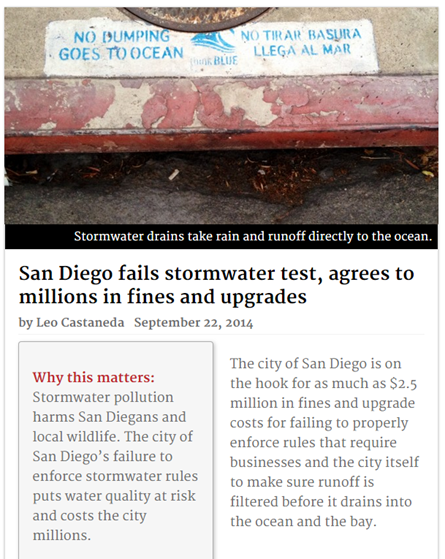Water quality is a very serious matter. That is why city governments are implored to ensure that their stormwater runoff management programs are up to current standards. One city that failed to meet these expectations is San Diego which, according to Inewsource, has been ordered to pay $2.5 million in fines and upgrade costs to the San Diego Regional Water Quality Control Board. The fines will only grow larger unless officials can finally establish reliable stormwater systems in the city:
The water board found 306 private properties and 13 city-owned capital improvement projects had missing or ineffective stormwater management technology. Some of the permits go back as far as May 2003. Of those, 142 private and eight public projects — including five of the parks set for extra upgrades — have yet to be fixed. The city has to bring all projects into compliance by Aug. 15, 2016, or face up to $10,000 a day in fines.
The penalties may sound a bit stiff but the water board is only carrying out its duties, as mandated by the federal Water Pollution Control Act (Clean Water Act). This legislation is quite strict, stating that stormwater systems in every state should be designed to minimize erosion and sediment discharge, along with other criteria needing to be met for the public’s safety.
Scientifically developed systems like StormChamber’s SedimenTrap™ can help meet such strict criteria with better efficiency. This kind of system catches sediment, pollutants, and particulates from storm runoff, making the water easier to sanitize and recycle for domestic uses. One thing that makes SedimenTrap™ unique is that it filters stormwater twice; as it enters and as it leaves the system.
This, and other water quality devices, can complement and bolster the sewer systems that, by themselves, the EPA has deemed inadequate for handling heavy rainfall in locations such as San Diego and elsewhere.
City sewer systems need supporting structures and equipment to ensure compliance with federal water quality standards. The EPA says runoff can easily be contaminated with hydrocarbons (from roads), pesticides (from residential lawns), phosphorus (from animal waste), and other chemicals. These contaminates can pose varying health risks, such as ear infections and gastrointestinal diseases, when they are introduced to community water systems.
In particular, coastal cities, like San Diego, have more at stake if contaminated runoff reaches the ocean and surrounding bodies of water. The beaches would have to be closed for a period of time to protect swimmers, significantly affecting local tourism industries.
Therefore, the pressure to establish more efficient storm water systems in cities is rightly justified and city governments will do well to encourage their constituents to do their share to this end.
(Source: San Diego fails stormwater test, agrees to millions in fines and upgrades, inewsource, September 22, 2014)






